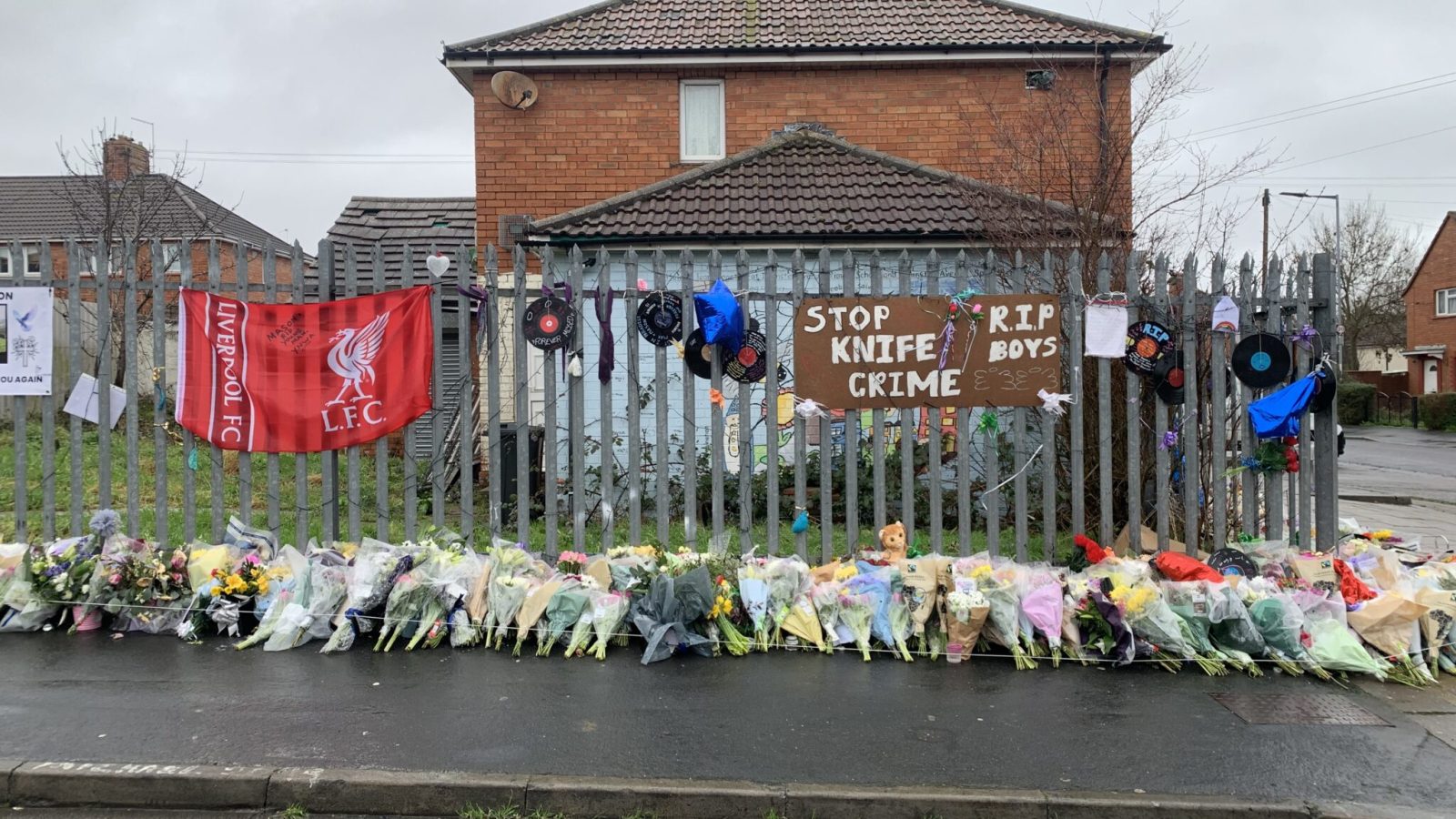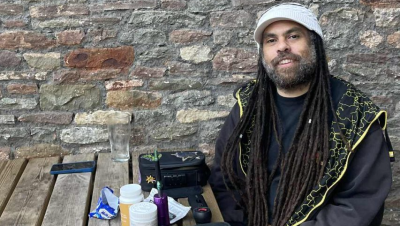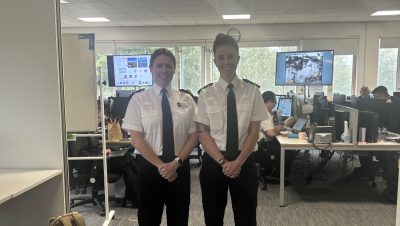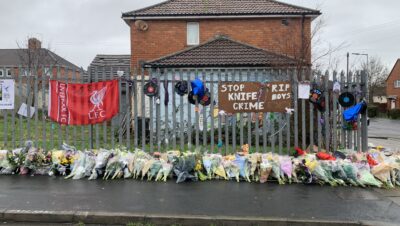Features / knife crime
Knife crime in Bristol triples in a decade
New data from Avon and Somerset Police has revealed annual knife crime in Bristol has more than tripled in the past decade.
The data obtained through a Freedom of Information request revealed that between January 2015 and May 2025, there were 13,791 knife offences recorded across the city.
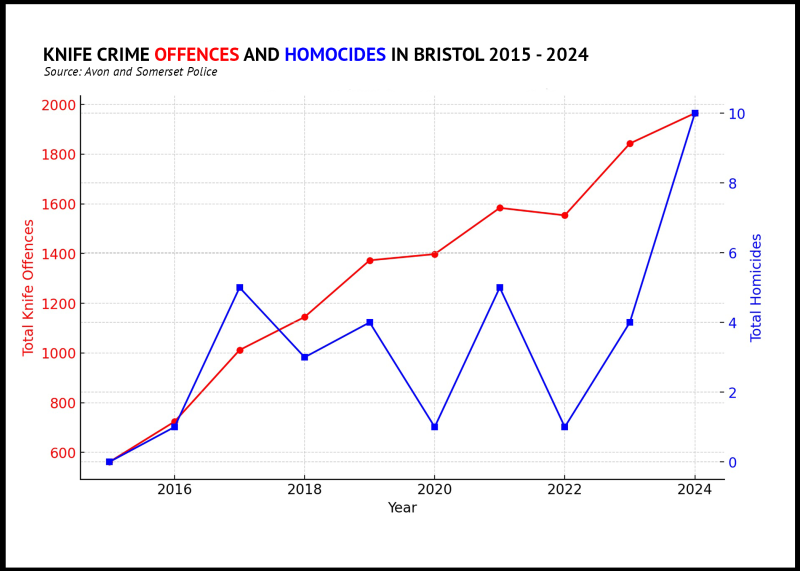
The data revealed a steep increase over 10 years, with a brief drop in homicides during lockdown in 2020 – image: Carla Wakfer
Police and Crime Commissioner Clare Moody insists however, that tackling knife crime is a priority for the force, with targeted initiatives like the Avon and Somerset Violence Reduction Partnership (ASVRP), which is a multi-agency group working to prevent and reduce serious youth violence and exploitation.
is needed now More than ever
It targets the root causes of violence through early intervention, education, community outreach, and support for young people and families.

South Bristol neighbourhoods have seen a large increase in knife crime within 10 years – photo: Aditya Thakur
Since 2016, 31 people have been killed in 26 knife incidents, with nearly half of those deaths in the last three years
An Avon and Somerset Police spokesperson echoed that knife crime remains a top priority and that from tracking local data, they suggest that knife crimes may actually be on decline in 2025.
No knife-related homicides have occurred in Bristol in 2025 so far, compared to eight at this point last year.
There has also been a 35.6 per cent drop in public order offences involving knives and a 21.1 per cent fall in robberies involving knives compared to the same period last year.
They also said that since January, 215 knives and bladed articles have been seized.
Two-thirds of knife-related deaths since 2016 involved someone known to the victim, and one in five involved mental illness.
Many of the victims of knife crime have been young boys, including 15-year-olds Max Dixon and Mason Rist, who were fatally stabbed in Knowle West, and 16-year-old Darrian Williams, killed in Easton.
All three victims were not connected to gangs or crime.
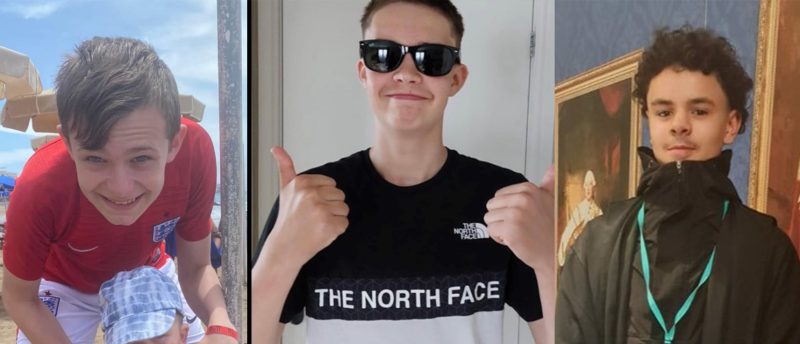
Young innocent victims: Mason Rist, Max Dixon and Darrian Williams – photos: families
Mason’s family spoke of him as “lovely and innocent,” expressing that “it is impossible to put into words how we feel” following his tragic death.
Max’s family described him as “a big character with a happy and joyful look on life,” remembering him as funny, kind and caring.
Both were murdered in a mistaken revenge killing while on their way to buy pizza. Five people were found guilty of the murders.
Court evidence showed no connection between Darrian and local gangs despite a verbal confrontation involving gang-related postcodes occurring moments before the attack.
The two teenage boys convicted of Darrian’s murder claimed self-defence, but the court found them guilty.
During the sentencing of Darrian William’s killers, a judge described Bristol as being in “the middle of a plague of knife crime”.
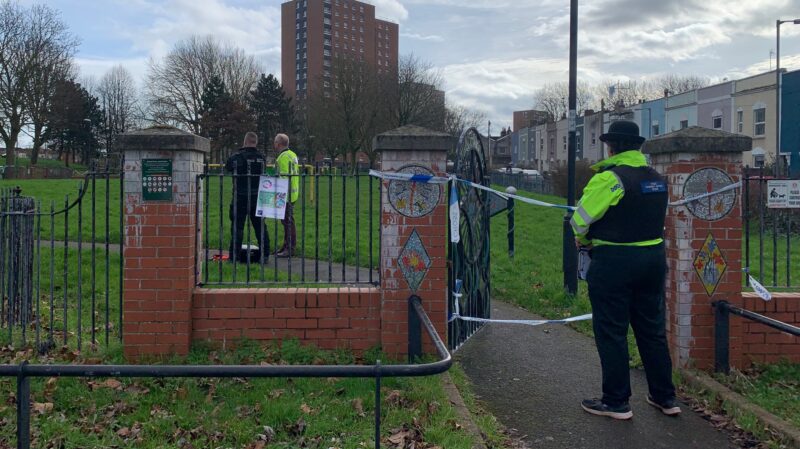
The scene in Rawnsley Park, Easton, following the fatal stabbing of Darrian Williams in 2024 – photo: Mia Vines Booth
Politicians have acknowledged the scale of the crisis and the need for both enforcement and prevention.
Kerry McCarthy, MP for Bristol East, said: “Even one death by knife crime is too many.
“The spate of deaths by stabbing we saw in Bristol in early 2024 was a particularly tragic time for the city.
“Tackling knife crime is a really complex area, and we can only address it through a multi-agency approach.”
Martin Bisp, CEO of Empire Fighting Chance, believes the figures reflect deeper, long-standing issues including: “austerity, lack of youth provision and cycles of fear.”
The Easton-based sport-for-development charity has firsthand experience engaging with young people on the frontline of the knife crime epidemic.
Through their work they use non-contact boxing and personal support to help young people overcome poverty and inequality.
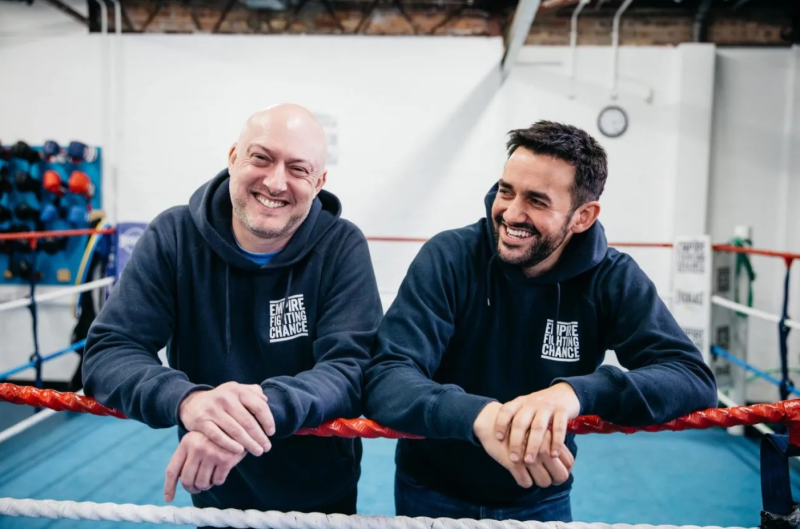
Martin Bisp (left) believes we can’t arrest our way out of violence. Photo: Empire Fighting Chance
Empire Fighting Chance are fundamentally focused on prevention – tackling systemic issues early before they affect children later in life.
Youth voice ambassador and community outreach coach at Empire Fighting Chance, Serena Wiebe said: “Kids don’t carry knives to be cool, they carry them because they’re scared.”
Austerity, the pandemic and social media have created a perfect storm.
A former counselling referral herself, Serena first came to the gym through bereavement charity Winston’s Wish after struggling to engage with therapy.
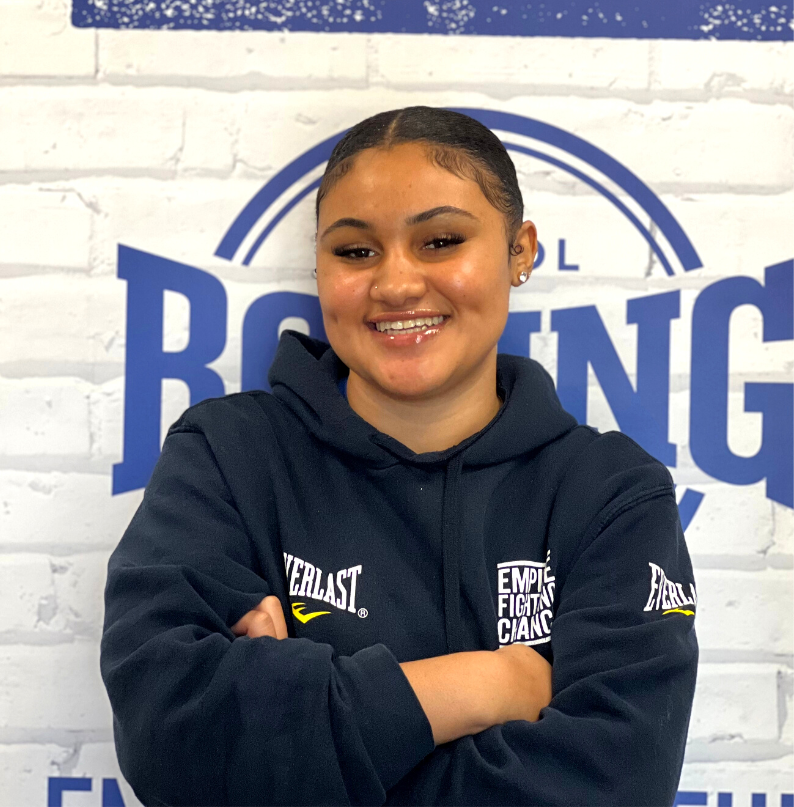
Serena Wiebe believes politicians need to stop “reinventing the wheel’ and invest in the programmes that already work – photo: Empire Fighting Chance
“I wasn’t talking in the sessions. I just told them, the only way you’re going to help me is if you get me work experience.
“That’s how I came to Empire. I didn’t even know what it was – but everyone was really welcoming. I was hired on the spot. That literally turned my life around.”
Now she coaches young people facing similar challenges.
She has shared her firsthand experiences of knife crime with the Labour government, talking directly to the prime minister Keir Starmer, and secretary of state for culture, media and sport, Lisa Nandy about the crucial need for services.
She has also worked alongside prolific knife crime campaigner Idris Elba and met the king to advocate for change, speaking about her experiences of losing close friends to knife crime and how it’s being desensitised.
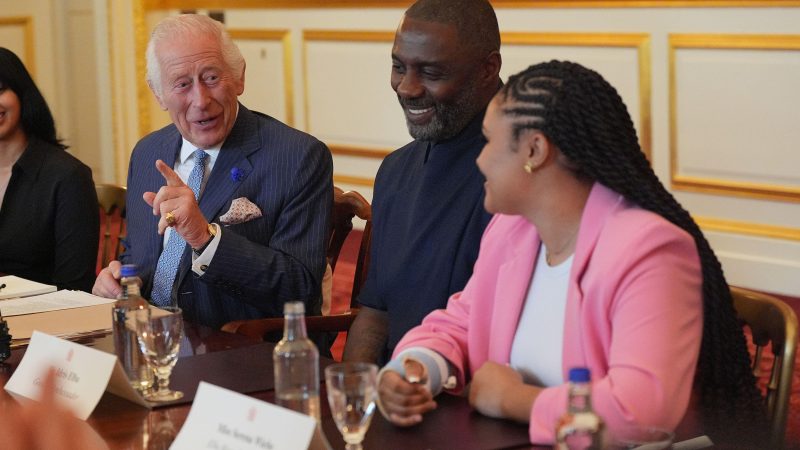
Serena has been campaigning alongside Idris Elba to tackle knife crime – photo: Yui Mok
For Serena, the rise in knife crime is inseparable from fear and instability.
“A lot of young people I speak to don’t carry knives because they want to.
“It’s not just about protecting themselves – it’s protecting their families.
“Some of them say: if you’re from the wrong area, you can get stabbed just for that. That’s how sensitive it’s got.”
Alarmingly, the recent data reveals that violence is no longer confined to postcode boundaries – people are being attacked across Bristol, even in areas previously considered to be safer.
Once concentrated in hotspots like St Paul’s and Easton, knife crime has increased across Bristol’s police beats, most notably in Hartcliffe and Hengrove, where the annual number of knife crime incidents in 2015 was 25 compared to 2024, when there were 138.
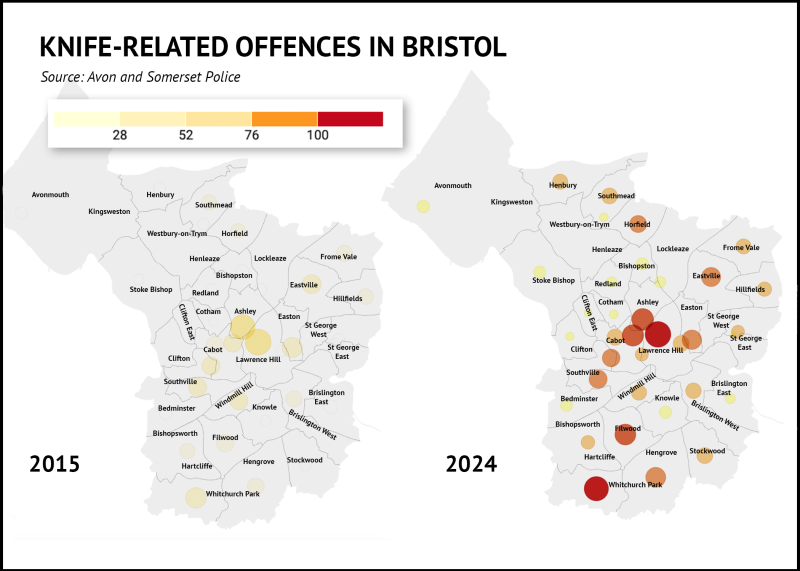
Circles chart different police beats within Bristol wards. Knife crime has increased across most of the city – image: Carla Wakfer
More than a dozen neighbourhoods have each logged over 400 incidents in the past decade.
Serena described how age has no limit in knife crime.
She found a 13-year-old outside a school with a knife while collecting their younger siblings: “They were just a kid, but they’d already decided they needed a blade to feel safe. That’s the reality.
“When I was younger, we had youth clubs. Some of these kids don’t have anywhere safe to go now.
“Honestly, lockdown made it worse. Young people were stuck inside, often in chaotic homes, without school support, without free meals, and spending more time online.
“On social media, they see videos and posts of people showing off knives. At 12 years old, if you see your classmates posting with knives, you feel like you need to carry something too.
“Scrolling through social media and seeing knives everywhere, normalised. That combination has traumatised a lot of kids.”
Her words reflect the figures: the pandemic years coincide with an increasing trend.
2020 recorded 1398 knife-related incidents, 2024 recorded 1965.
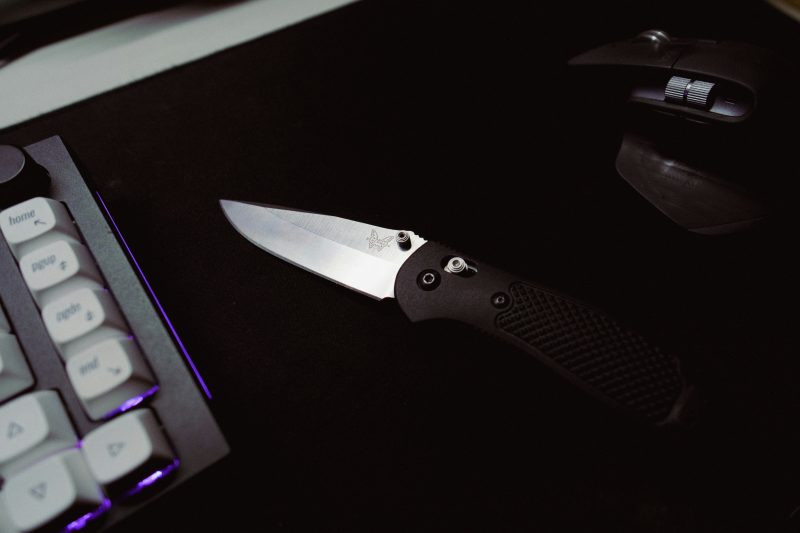
Austerity, lockdown and social media are believed to have created the perfect storm – photo: Dmitry Shkaev
Empire Fighting Chance offers a way out, not just a safe space to do boxing but also build confidence, mentoring, and life skills.
Serena said: “In therapy, you sit in a room and you’re expected to talk about the worst parts of your life. Kids switch off. But with boxing, you can just come in and hit a bag for two weeks before you even say a word.
“Instead of saying, ‘I’m going to therapy,’ young people can just say, ‘I’m going boxing.’ That feels cool, not shameful.”
For Serena, interventions don’t need to be grand: “It only takes one person to believe in you, one person to tell you you’ve got potential, and that can change everything.”
WECA mayor, Helen Godwin recently referenced interventions, particularly around skills, including the £5 million Youth Guarantee to provide training and jobs for young people across the West.
Bristol South MP Karin Smyth also stressed the need for systemic change: “Knife crime touches too many lives in our city.
“Community policing was cut to the bone under the last Conservative government’s austerity policies. There are half as many PCSOs as there were 14 years ago.
“The Labour Government is rightly tackling that record of failure, including making sure there is a named, contactable police officer in every community.”
At a Police Question Time event on July 17, chief constable Sarah Crew said: “Every community should have a named, visible officer that they know, focused on local priorities and accountable to residents.”
Avon and Somerset Police have also received £4.6m in extra funding – equivalent to 70 new officers – and recruitment is already underway.
In the meantime, eight sergeants and 72 officers have been redeployed into neighbourhood policing across the force’s eight local policing areas, each supported by a neighbourhood tasking team.
Senior officers insisted these changes are already having an effect, and stress that commitments such as beat surgeries and public meetings are giving people more chances to engage directly with their local police.
Avon and Somerset Police also listed enforcement tactics, including targeted patrols, stop and search, and confiscation. But officers stress that policing alone will not solve the problem.
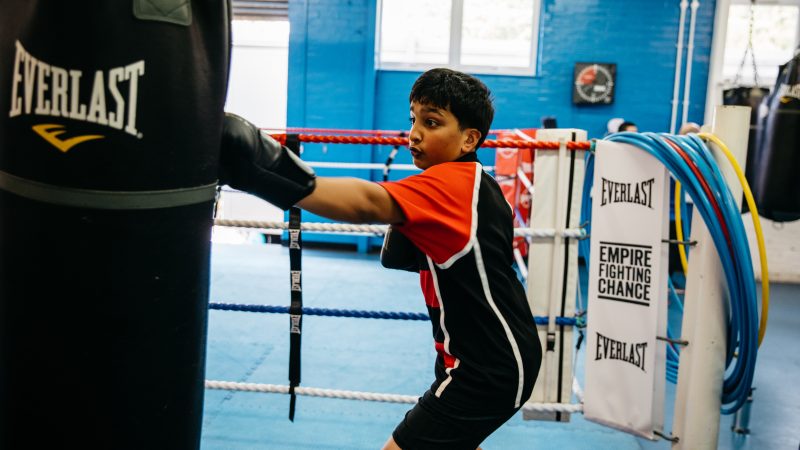
Empire Fighting Chance offers young people a place to build their confidence and self-esteem – photo: Empire Fighting Chance
For Martin Bisp at Empire Fighting Chance, the lesson is clear. “We can’t arrest our way out of violence. We need equity. That means giving young people real chances: jobs, skills, trips that open their horizons.
“Instead of wasting money making up new schemes, fund the projects already working.”
And for Serena, who has turned her own life experiences into a mission to help others, the message is equally blunt: “Invest in what already works. Too much money gets wasted building shiny new initiatives instead of resourcing local organisations already making a difference.
“Every young person I work with has talent. It might be in boxing, in cooking, in music, in business. Our job is to give them the chance to see that.”
The conclusion from frontline workers, politicians, and police alike seems inescapable: enforcement alone cannot reverse this steep rise in knife crime.
As a city, we owe it to the youth, to the victims and their families, and to ourselves to find solutions that can bring the numbers down.
Carla Wakfer is reporting on Easton, Eastville and St George as part of Bristol24/7’s Community Reporters programme, aiming to amplify marginalised voices and communities often overlooked by mainstream media.
This initiative is funded by our public, Better Business members and a grant from the Nisbets Trust.
Main photo: Mia-Vines Booth
Read next:
 Our newsletters emailed directly to you
Our newsletters emailed directly to you